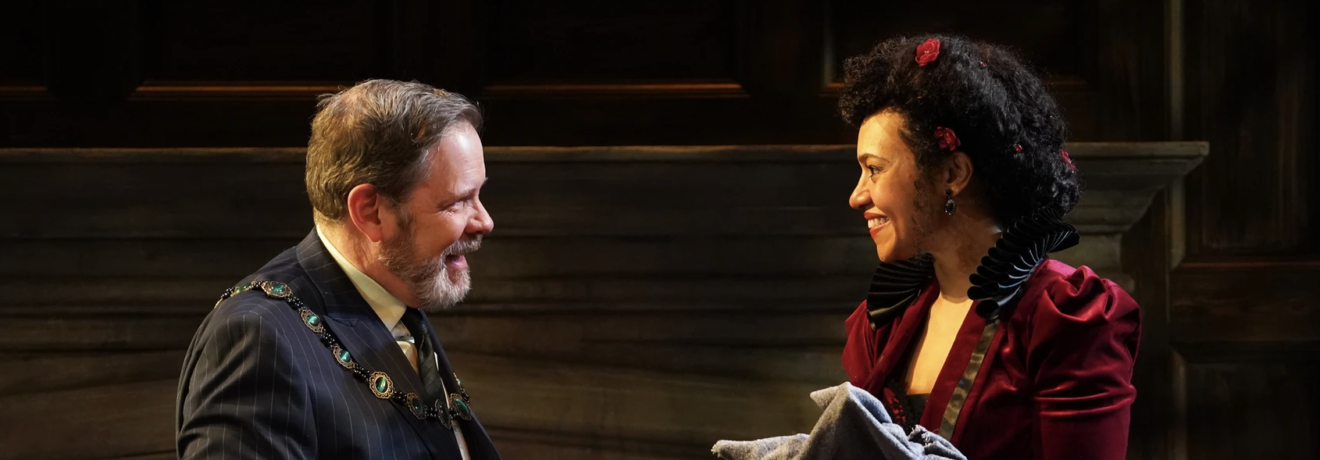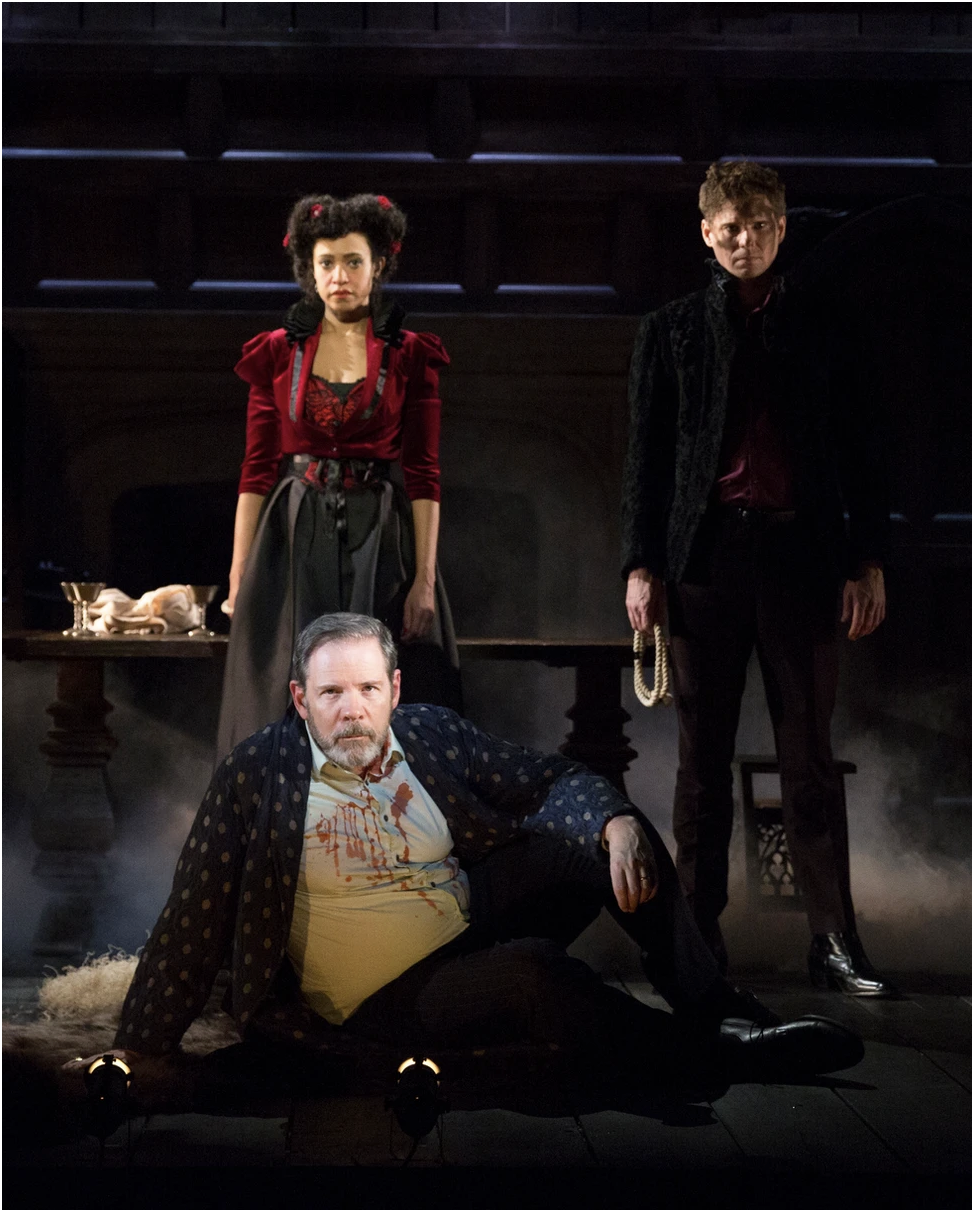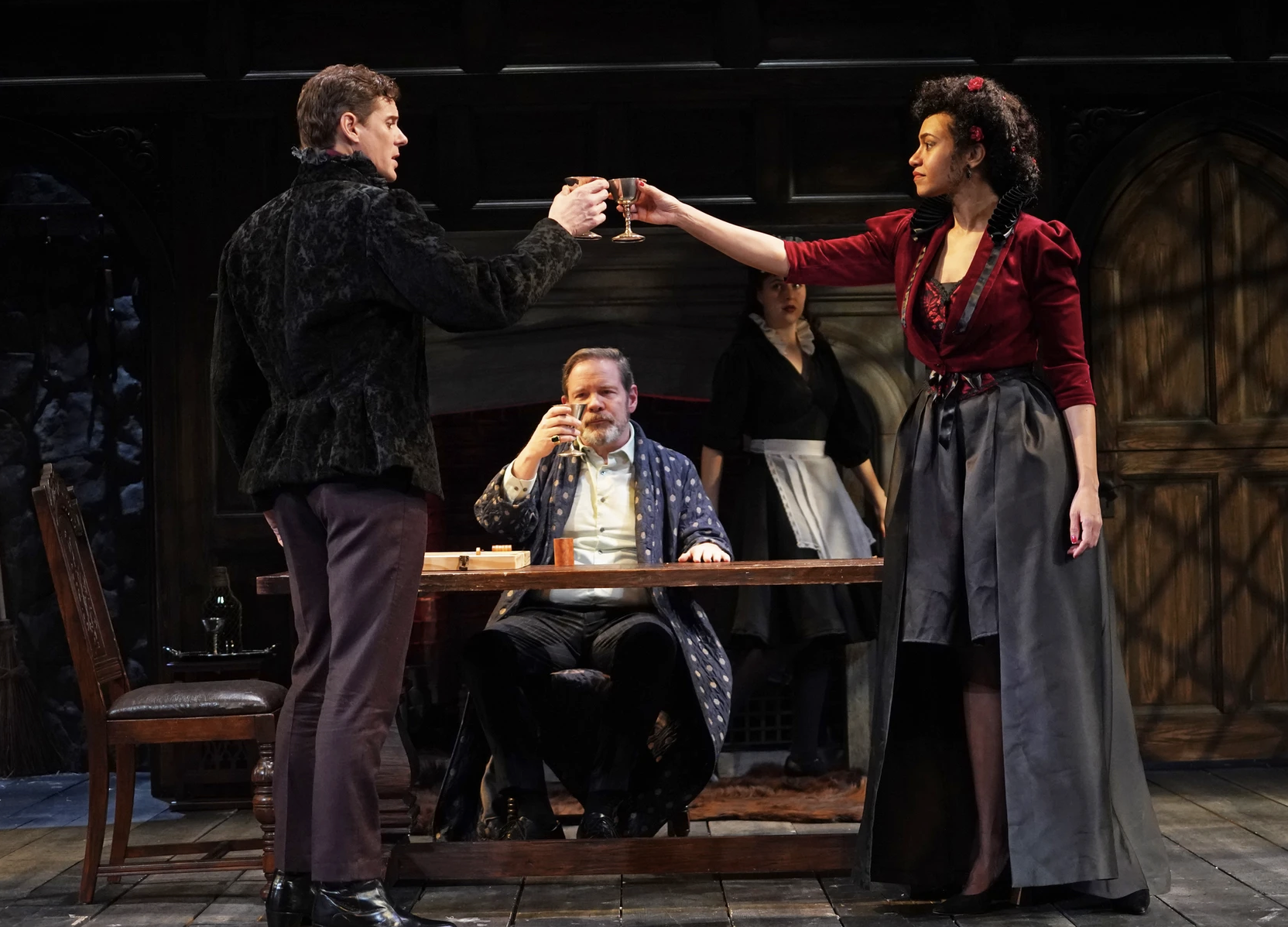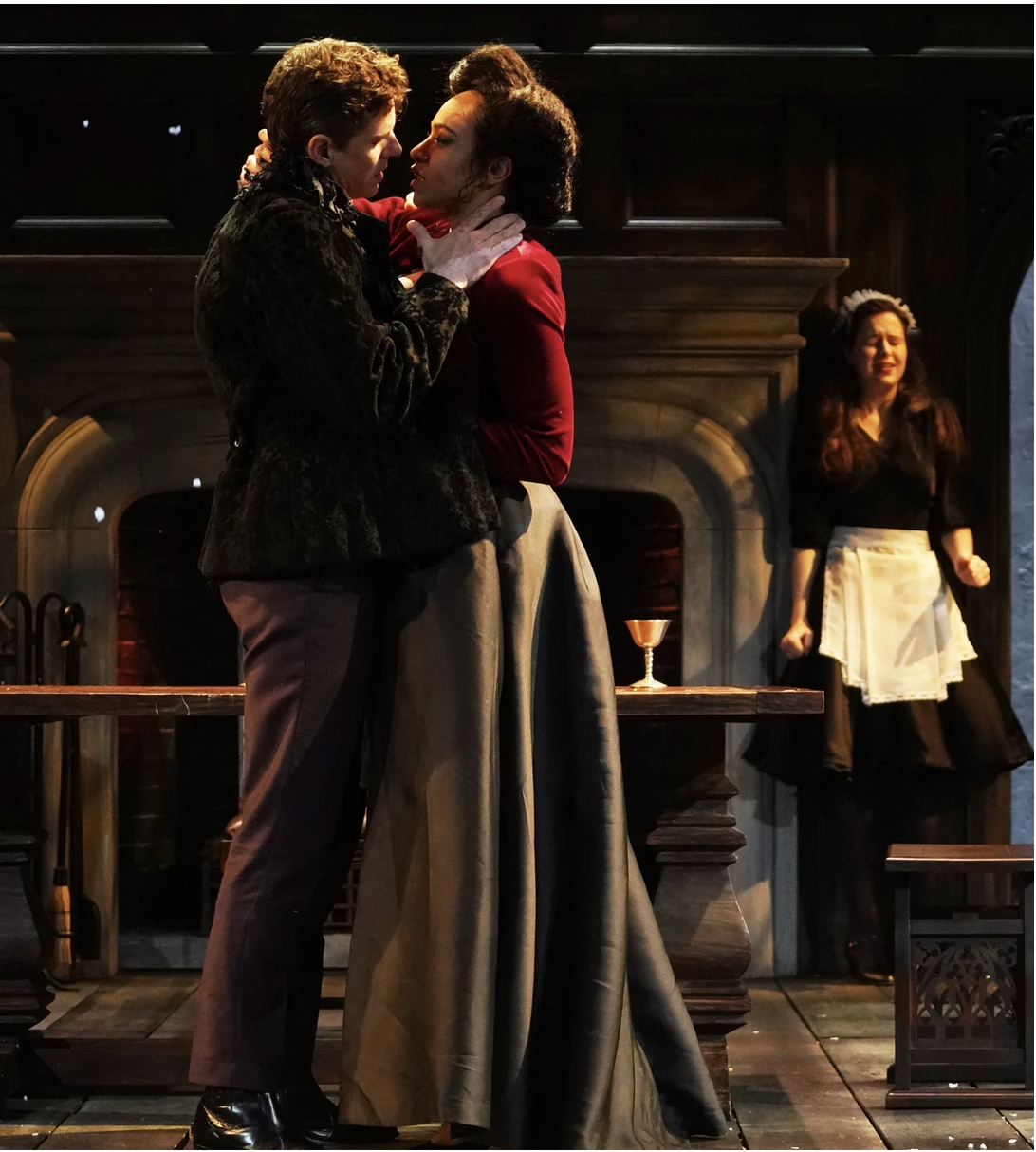Theater Reviews
Domestic Tragicomedy: Arden of Faversham at Red Bull Theater

Alice Arden wants her husband dead. She wants to be with Mosby, her lover. But she also wants freedom: from her husband’s suspicious surveillance, from the bonds of marriage, from the myriad quotidian experiences of subordination that even a gentleman’s wife must undergo. Mosby wants Arden dead, too. He can’t stay away from Alice, but he’s also spurred by social ambition. He’s already risen from poor clothing-mender to Lord’s steward; to take a wealthy gentleman’s place socially as well as sexually would be a triumph.
The mingled motivations of this adulterous couple are the heart of Red Bull Theater’s adaptation of the anonymous late 16th-century domestic tragedy. Cara Ricketts’s mesmerizing Alice by turns growls with discontent and cries out with irrepressible passion; her capacity to want—whether love, freedom, power, or excitement—is clearly far greater than any one object, any one man. For the entirety of the play’s first half, she seems ready to burst out of her stiff, constraining gown. For his part, Tony Roach’s Mosby exhibits a coldness and self-absorption that serve as constant reminders that, for him, desire comes second, ambition first. These two can’t quit each other, but their ardor is as instrumentalizing as it is intense. At the peak moment of their passionate entanglement—newly committed to their murderous plot, entwined on a luxurious rug by a roaring fire—Arden (Thomas Jay Ryan) strolls into the downstage foreground. He frets about lodging arrangements, fidgets with his elegant fur-trimmed coat, gives orders to his servant Michael (Zachary Fine) and friend Franklin (Thom Sesma). He’s playing in a completely different scene, but the point of these overlapping tableaux—lovers by the fire, Arden fussing and bossing—is clear. What Mosby wants to be, and what Alice wants to be free from, takes center stage.

Directed by Jesse Berger, this production is at its finest in moments like this: moments that elaborate the complexities and muddiness of different characters’ motivations and desires. The text has been fairly freely adapted Jeffrey Hatcher and Kathryn Walat—more on that below—but they have sensitively preserved and in some cases amplified the original’s characterological weirdness. The complexity of feeling and motivation that often baffles readers of the play here becomes a kind of principle of construction, and the result is by turns hilarious, disturbing, and enthralling. No one in this world experiences a simple emotion, a straightforward desire. Alice wants Arden dead, but she used to love him, and her face lights up recounting that love to her maid Susan (Emma Geer). The lustful Susan falls in love with her sweet, bumbling fellow servant Michael, but her desire to be desired by someone, anyone, overshadows her grief at Michael’s sudden death. Arden recognizes that his friend Franklin loves him deeply (a hint in the original text here developed into a full plotline); he clearly values that love. Yet at times he treats Franklin less like a person and more like a piece of furniture. These spiky, contradictory characterizations are played to the hilt, in all their confounding glory. They are augmented by a beautifully detailed visual world (thanks to scenic design by Christopher Swader and Justin Swader and costumes by Mika Eubanks). For much of the play, Arden’s somber wood-paneled Tudor home provides a backdrop for his wife’s colorful outbursts; in one stunningly realized outdoor scene, magnificent plumes of fog both mirror and amplify characters’ confusion.

If this production nails Arden’s tricky characters, it flounders when it comes to the plot. The original play has a fairly straightforward episodic structure: repeatedly, Alice’s and Mosby’s associates and hirelings try to kill Arden; repeatedly, they fail. This is both funny and horrible. Serial bungling invites laughter, but the structure of delay also creates space for doubt, fear, and stirrings of conscience. This adaptation keeps the episodic structure, but adds a twist: for almost every attempt on Arden’s life, there’s an accidental death (or, in one case, a near-death). This leads to scenes of slapstick violence, as when the hired murderers Big Will and Shakebag (scene-stealing comic duo David Ryan Smith and Haynes Thigpen) mistake Franklin for Arden and bash him on the head with an oar. Or when Michael and the disgruntled widow Greene (Veronica Falcón) fatally tussle over an envenomed crucifix prepared by the painter and poisoner Clarke (Joshua David Robinson), whom Franklin, in a separate scene, has mistaken for a “ruffian” and stabbed to death. The adaptation is attentive, even loving: almost every addition emerges from a detail in the original, right down to the poisoned crucifix and the fear of errant ruffians. The goal seems to be to spin this unadorned domestic tragedy into something gorier, campier, bigger, while leaving its heart intact. But that heart’s beat is, at times, faint. The thrum of dread as Arden marches closer and closer to his demise becomes hard to detect under all the added clamor. And as the bodies pile up, life in this world starts to seems so cheap that Arden’s murder—the culmination of the whole play, the realization of Alice’s and Mosby’s fierce desires—starts to feel potentially anticlimatic.

In spite of this, the scene of Arden’s killing ends up being surprisingly effective. The staging emphasizes the tragedy’s domesticity: Mosby and Arden sit at table, playing backgammon in near-silence, while Alice stands behind them, watching the game as she might on any other evening. At Mosby’s cue, Big Will and Shakebag emerge from their hiding place and whip a towel around the older man, immobilizing him. Mosby strikes him with a hot iron—a tool of the tailor’s trade, and a reminder of Arden’s earlier class-based insults— and Alice slices his throat with a knife, blood arching across the stage. This collaborative, choreographed death is terrifying in a way the earlier, added deaths—deaths that felt like jokes—were not. There is a ghastliness to the plainness of it all: the homely setting, the domestic implements that become murder weapons: towel, iron, kitchen knife. Throughout the scene, two upstage doors open onto the world outside the house; through them, we see snow falling against a night sky—a reminder that Arden’s murder is an extraordinary act in an ordinary world.
After Arden’s death, the problem of what to do with the body generates what’s left of the plot. The team’s inability to hide evidence cleanly and effectively leads to detection, arrest, and execution (one wonders, perhaps uncharitably, how all those other bodies were so easily gotten rid of). The performance ends with the cast joining together to deliver, one by one, the final speech, in which the characters’ fates are enumerated. This mingling of voices is oddly moving, while the flatly intoned list of horrible ends—hanged, burned, quartered—is oddly hilarious. It’s a fitting finale, both for the original tragedy, laced through as it is with opportunities for nervous laughter, and for this new adaptation, which amplifies both horror and the humor throughout.
